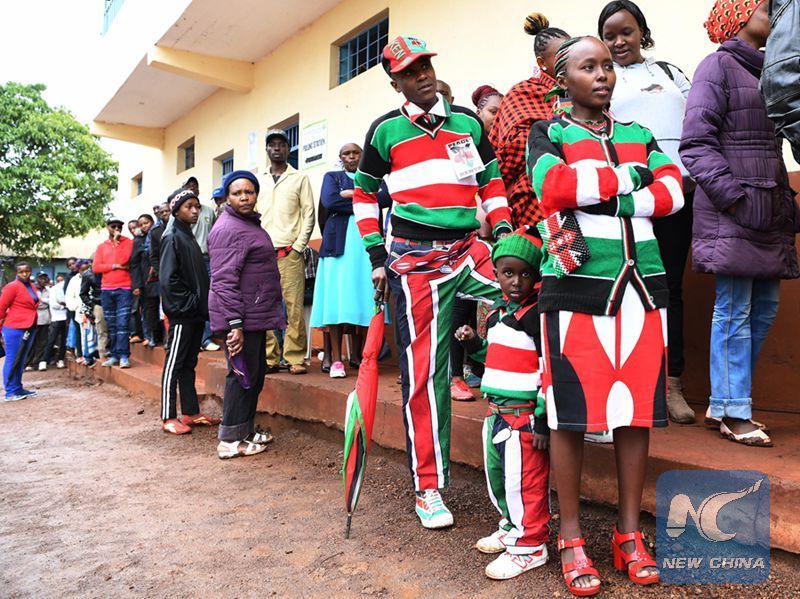
People queue to vote in Kenya's repeat presidential polls at a polling station in Nairobi, Kenya, Oct. 26, 2017. Voting in Kenya's repeat presidential polls began on Thursday as some polling stations, mainly in opposition strongholds, reported disruptions and low voter turnout. (Xinhua/Chen Cheng)
NAIROBI, April 4 (Xinhua) -- Kenyan leaders have moved to strengthen their parties and consolidate their political bases in readiness to battle for the presidency in 2022.
Wiper Party, Ford Kenya, Amani National Congress (ANC), Narc and ODM are among parties that are taking strides to solidify themselves, either by going independent or merging.
The parties have their political bases in western and eastern Kenya. Ruling party Jubilee and its political bases remain solid under President Uhuru Kenyatta who is serving his final term and his Deputy William Ruto.
Ford Kenya and ANC are working on a plan to merge and form one party to consolidate the support of the western Kenya region.
Wiper and Narc have similarly united in bid to amass the 4 million votes in Ukambani.
Leaders at the Coast and those from Maasai and Kisii are equally working on plans to form parties and give their communities political bargaining power.
Opposition leader Raila Odinga's ODM party is working on new structures and is currently carrying out an audit of its performance in 2017 polls as it seeks to re-energize itself.
The Jubilee Party, sure of backing from its political bases, is currently reaching out to leaders from other regions to ensure it remains in power after President Uhuru Kenyatta's second term ends in 2022.
"There is need to rebrand our party so that we can compete with others at national level. One Kenya means one people and we will embrace all as we seek the presidency of this country," said Wiper party leader Kalonzo Musyoka on Monday at a meeting, where he announced the party would rebrand.
Justus Murunga, an ANC party MP from western Kenya, said his party's and Ford Kenya leadership have agreed to work together to consolidate the western Kenya votes before reaching out to other communities to ask them for support.
Analysts noted that the current political activities are part of the major realignments that have started to take place in the political scene as time progresses.
"I see many parties rebranding in bid to re-energize themselves and position leaders in a better place to bargain for positions," said Henry Wandera, an economics lecturer and political analyst in Nairobi.
Wandera observed that many of the leaders re-shaping their parties currently know they cannot win on their own since the outfits have single or two communities backing.
"The point is the leaders are positioning themselves to go into coalitions by stronger parties and thereafter seek positions by promising to deliver certain number of votes," he noted.
The strategy being employed by the parties, according to Wandera, is history repeating itself as it was employed in 2007, 2013 and 2017 polls.
"Kenya has over 30 political parties. I see this number rising as leaders seek a slice of the 2022 political cake," he reckoned.
He noted that the heightening political realignments may put Kenya in perpetual campaign mode until the elections.
Ordinary Kenyans are divided on the ongoing political developments. Some believe the leaders are pursuing their own selfish interests while others see the moves as the only way for their communities to get power.
"I don't support the move for each community to form its own party because it enhances tribalism in the country and divides us more," said Moses Kimutai, a tea farmer in Nandi.
He noted that leaders should be striving to form one party that unifies the country.
Moses Adamba, however, believes otherwise noting there was nothing wrong with leaders forming and strengthening their parties as long as it is done with the national good in mind.
"The ruling party Jubilee came from two political parties, The National Alliance Party (TNA) and United Republican Party (URP) whose political bedrock were in central and Rift Valley. Their coming together saw them take power. There is nothing wrong with other communities doing the same," he said.
On social media, the activities in political parties have been debated for the better part of Monday, with a majority of Kenyans castigating leaders for only rebranding parties but not changing ideologies.
"From ODM (K), to Wiper Democratic Movement, and now One Kenya Movement (OKM). It seems every party would rebrand for 2022, including Jubilee party, but what are their ideologies?" wondered James Adango on Twitter.

